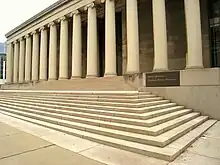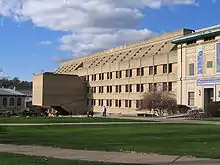Mellon College of Science
The Mellon College of Science (MCS) is part of Carnegie Mellon University in Pittsburgh, Pennsylvania, US. The college is named for the Mellon family, founders of the Mellon Institute of Industrial Research, a predecessor of Carnegie Mellon University.
 The Mellon Institute of Industrial Research is one of the principal facilities of the Mellon College of Science | |
| Established | 1967[1] |
|---|---|
Parent institution | Carnegie Mellon University |
| Dean | Rebecca Doerge[2] |
| Undergraduates | 793[3] |
| Postgraduates | 315[3] |
| Location | , , |
The college offers various bachelor's, master's, and doctoral degrees. It also awards the Dickson Prize in Science. Since 2016, its dean is Rebecca Doerge.[2]
History
The Mellon College of Science was founded in 1967, when the Carnegie Institute of Technology merged with the Mellon Institute of Industrial Research to form Carnegie Mellon University. The scientific faculty and staff of both institutions became part of the new college, then named the Mellon College of Engineering and Science. As the college grew and scientific research advanced, the Carnegie Mellon College of Engineering was split off in 1970, and the Carnegie Mellon School of Computer Science split off in 1988.[4]
Facilities

The administration of MCS, as well as most of its biological sciences and chemistry faculty and research labs, and the college's library, are based in the Mellon Institute, which was constructed in 1937. The neoclassical building was added to the National Register of Historic Places in 1983, and was designated as a National Historic Chemical Landmark in 2013 by the American Chemical Society.[5] The college's physics and mathematical sciences departments are based in Carnegie Mellon's main campus in Wean Hall, a Brutalist building constructed in 1971.[6]
Organization
The Mellon College of Science houses four academic departments: Chemistry, Biological Sciences, Physics, and Mathematical Sciences, each of which grants a variety of undergraduate and graduate degrees.[7] In addition, the college also oversees or is affiliated with a number of interdisciplinary research centers, including the Pittsburgh Supercomputing Center.[8]
Notable people
- Ada Yonath (Post-doctoral fellow, 1969; Honorary Doctorate in Science and Technology, 2018), 2009 Nobel Prize in Chemistry
- Krzysztof Matyjaszewski (Professor), discoverer of atom transfer radical polymerization
- Clarence Zener (Professor, 1968–1993), theoretical physicist, discoverer of Zener effect
- John Pople (Professor, 1964–1993) 1998 Nobel Prize in Chemistry
- Walter Kohn (Professor, Carnegie Institute of Technology, 1950–1960) 1998 Nobel Prize in Chemistry
- Shafi Goldwasser (BS, 1979; Honorary Doctorate in Science and Technology, 2018) 2012 Turing Award
- Clifford Shull (BS, Carnegie Institute of Technology, 1937) 1994 Nobel Prize in Physics
- Paul Flory (Executive Director of Research, Mellon Institute of Industrial Research, 1957–1961) 1974 Nobel Prize in Chemistry
- Otto Stern (Professor, Carnegie Institute of Technology, 1933–1945) 1943 Nobel Prize in Physics
- Clinton Davisson (assistant professor, Carnegie Institute of Technology, 1911–1917) 1937 Nobel Prize in Physics
- John Nash (BS, MS, Carnegie Institute of Technology, 1948) 1994 Nobel Memorial Prize in Economic Sciences, inspiration for A Beautiful Mind
- John L. Hall (BS, MS, PhD, Carnegie Institute of Technology, 1956, 1958, 1961) 2005 Nobel Prize in Physics
- Paul Lauterbur (research associate, Mellon Institute of Industrial Research, 1951–1953, 1955–1963) 2003 Nobel Prize in Physiology or Medicine
References
- Panko, Ben (2018). "Feature: 50 Years of Science and Counting". Mellon College of Science Magazine. No. Volume 10. Mellon College of Science. Retrieved 11 March 2019.
- "Rebecca Doerge Appointed Dean of Mellon College of Science", Carnegie Mellon University News, May 25, 2016, retrieved 2017-10-26
- "College Facts – Mellon College of Sciences – Mellon College of Science – Carnegie Mellon University". www.cmu.edu. Retrieved 11 March 2019.
- "History and Organization" (PDF). Carnegie Mellon University Factbook. No. Volume 30. Carnegie Mellon University Office of Institutional Research and Analysis. January 2016. Retrieved 11 March 2019.
- "Mellon Institute at Carnegie Mellon University National Historic Chemical Landmark". American Chemical Society. Retrieved 11 March 2019.
- IMAGINING THE MODERN : architecture, urbanism, and the pittsburgh renaissance. MONACELLI Press. May 28, 2019. pp. 252–253. ISBN 978-1580935234. Retrieved 11 March 2019.
- "Departments – Mellon College of Science – Mellon College of Science – Carnegie Mellon University". Mellon College of Sciences. Retrieved 11 March 2019.
- "Research – Mellon College of Science – Carnegie Mellon University". Mellon College of Science. Retrieved 11 March 2019.
- Fenton, Edwin (2000). Carnegie Mellon 1900–2000: A Centennial History. Pittsburgh: Carnegie Mellon University Press. ISBN 0-88748-323-2.
- Schaefer, Ludwig (1992). Evolution of a national research university, 1965–1990 : the Stever administration and the Cyert years at Carnegie Mellon (1st ed.). Carnegie Mellon University Press. ISBN 978-0887481178.
